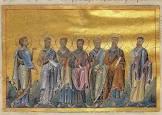
The apostles were specially chosen by Jesus and it seems they were beginning to think of themselves as an exclusive group. They scolded a man who cast out devils in their Master’s name. We can almost hear them saying to one another: “That’s our job!”
A name has great importance; it is part of a person. Elizabeth had to struggle with her relatives and friends about what her son was to be called. The angel Gabriel told Mary that her son was to be named Jesus. A name is so much part of a person. Carrying out an action in someone’s name means that you are doing it on their authority.
St Paul talks about different gifts which contribute to the body of the church(Romans 12:6). It is important that the church discovers and encourages the gifts of its members. This is especially true at this time, when clergy are becoming fewer and are growing old.
The late Gerard Hughes SJ, in his book God of Surprises, quotes a work by von Hugel entitled The Mystical Element in Religion. He describes three main stages in human development: infancy, adolescence and adulthood. He maintains that religion needs to acknowledge the needs of each stage, which continue throughout life. The institutional element gives a framework and stability for infancy, the critical for adolescence and the mystical for adulthood. If one of these elements becomes too strong the church community suffers. The institutional can too obsessed with rules and encourage childishness; the critical can undermine with too much negativity; and the mystical can lead into flights of fantasy, cutting loose from the basic structures and even developing fanaticism. A church that has solid foundations asks questions about itself and has a rich spirituality will be healthy, and its member will be free to contribute their gifts to God’s service.